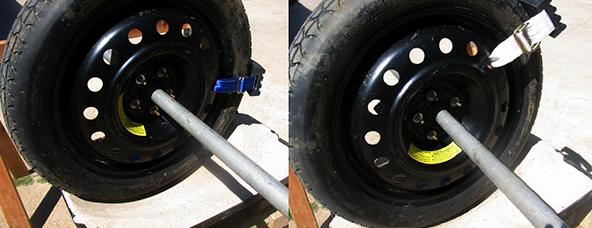Your Cart is Empty
360° Product Testing has independently determined and documented the performance of Trac-Grabber tire traction innovation via a custom test stand configured with a typical automotive tire. A sample tire was measured for the relative amount of effort/work for improved traction on a variety of materials. Evaluation included simulated “slipping” scenarios.
The Trac-Grabber is an innovation designed to enhance the ability of a slipping tire to extract itself from a poor traction situation. Tested products are summarized by their dominant strap color and overall rubber block dimensions.
| Parameter | Car / ATV | Truck / SUV | Oversize XL |
|---|---|---|---|
| Block Length | | | |
| Block Width | | | |
| Block Depth | | | |
| Strap Size | | | |
Trac-Grabbers were installed using the D-ring locking with the full length of Velcro. The rubber part of the product was pulled in tension to determine the maximum holding force. The failure mode for both the car and truck-based models was the slipping of the strap against the Velcro. The onset of initial Velcro stress / slippage was noted based on audible sounds.
The ultimate force recorded is the maximum force exerted at which the strapping system could no longer support the load.
The image at right shows a Trac-Grabber installed on a hydraulic ram to test the strength of the retaining straps. In the following table, “Initial Slippage” refers to the applied force at which the Velcro first began “stretching”, while “Ultimate Max Strength” is the applied force at which the strapping system could no longer support the load.
| Initial Slippage | Truck Strength | |
|---|---|---|
| Car / ATV | | |
| Truck / SUV | | |

Straps are very long to provide for attaching to large tires. The Trac-Grabber is intended for installation on open wheels. Results will vary with circumstances, i.e., conditions, operator, tires, and vehicle.
Both the car and truck Trac-Grabber products demonstrated that they notably increased the tested tire’s traction. This is due to an increase in the effective tire height and lift, the paddle effect, and the concentrated pressure on a small surface area.